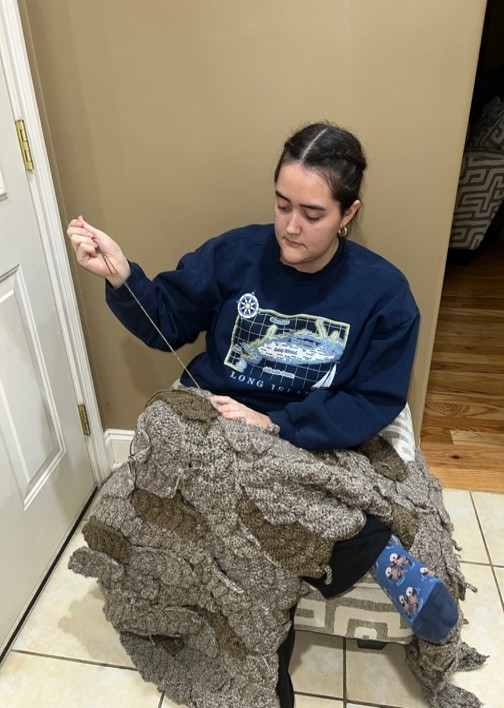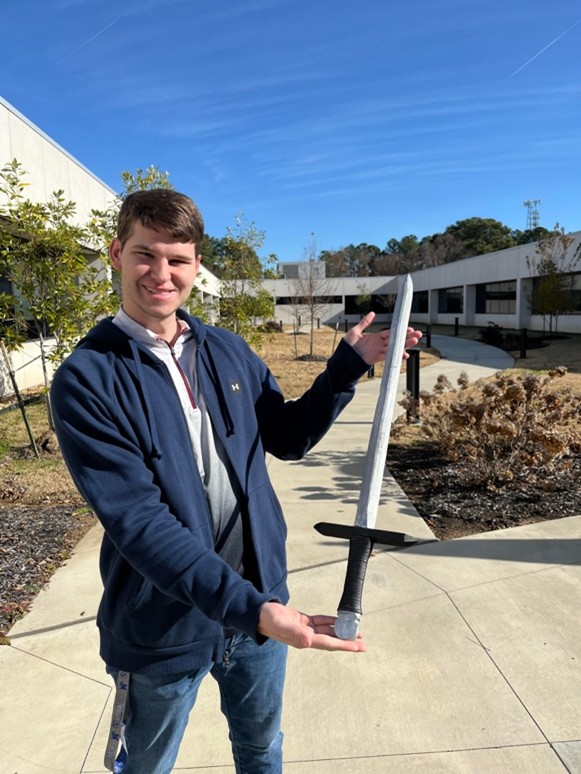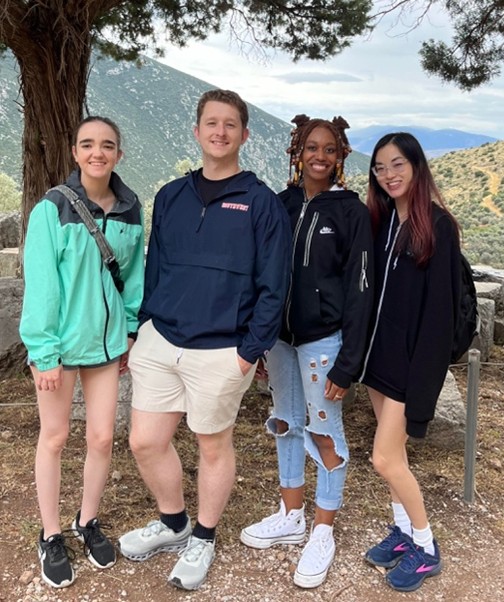Southwest Students Get Creative with Mythology in ENGL 2160
Students in Thad Cockrill’s in-person section of ENGL 2160 class concluded the Fall 2024 semester by presenting creative projects that were the culmination of their semester-long study of mythology. The course was first offered in Summer 2023 as an online course and since then has been offered both online and in person. It counts as a humanities literature elective in the General Education program at Southwest.

Taylor Waltz working on her crocheted version of the
a feathered cloak of the Norse goddess Freya.
“The course begins with a look at the familiar,” Cockrill said, “the Greek and Roman myths that many students have become acquainted with already.” He said that the course then moves on to include explorations of other mythological systems, including Native American, Hindu, and even contemporary mythology like Star Wars.
For their creative projects, students are encouraged to take on non-Greek and non-Roman subjects to demonstrate the diversity of mythology, as well as the archetypal elements that reverberate around the globe and show commonalities among various cultural traditions.
Projects this semester ranged from a replica of the staff of the Chinese monkey king Sun Wukong, to a model of a Mesopotamian ziggurat, a shrine to a Yoruba orisha, and a diorama of the Cherokee creation story, complete with animal figurines and a mountain, representing the ones created by buzzards, according to the myth of Unetlanvhi, the Great Spirit.

Joseph Lee displays his wooden model of the
sword of Thrungva.
Cockrill added that, because of the popularity of the Thor movies, students come to his course with a surprising knowledge of Norse mythology. They also often display a strong acquaintance with Japanese mythology, which he traces to their interest in manga and anime, as well as video games.
“I have learned a lot from my students,” he said.
Students in the in-person section of the course present their projects in class, usually around Week 12 of the semester, and online students submit theirs via YouTube links that include documentation of their process in creating the projects. Students post their projects online in a discussion forum, and 20 percent of their grade for the project is based on audience appeal.
“The key to success for these projects,” Cockrill said, “is that they include a visual component and are handmade or hands-on.” He encourages them to be inventive in proposing projects that build on their own individual skills and gifts. Some presentations have included collaborative skits or music. He noted that a student last year even brought his cello to class to perform a piece of music from the Hindu tradition in Bali. “I want to see them bring an organic element to their study,” he added.

Mythology students stop for a photo op at the shrine
of Apollo, in Delphi, Greece, which they visited as part
of a TnCIS study abroad program.
Carlos Espinal enrolled in an online section of the course last semester because he thought it sounded interesting, even though he didn’t have much more than a superficial knowledge of mythology. “I am very interested in delving deeper into those things on which all I have is surface-level knowledge,” he explained. “I think mythology can be relevant to my life in the sense that there are a lot of valuable moral lessons to be learned from them. Follow this link to see Carlos’s project on the Aztec figure Quetzalcoatl.
Last May, one section of the course was part of a study-abroad program in Greece, through the Tennessee Consortium for International Studies. While there, eleven mythology students visited sites including Delphi, and its shrine to Apollo; the ancient temple of Poseidon at Cape Sounion; and the Parthenon, Athena’s temple on the Acropolis in Athens.
The course usually makes with one in-person section and two online sections. If you are interested in learning more about the course, please contact Thad Cockrill at 901-333-4604 or tcockrill@southwest.tn.edu.